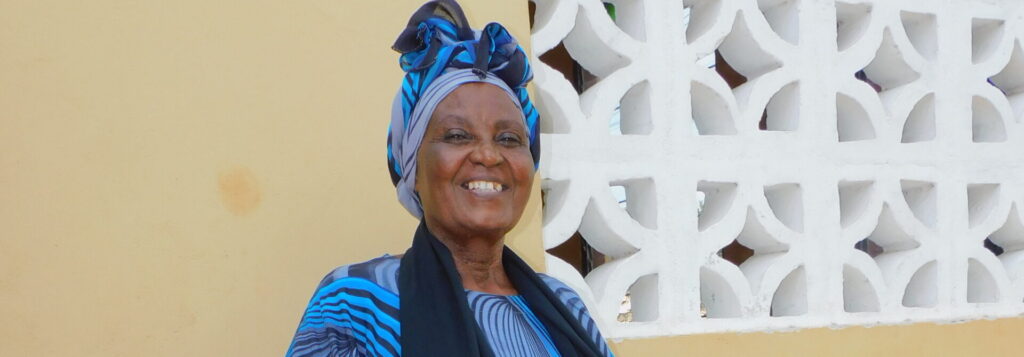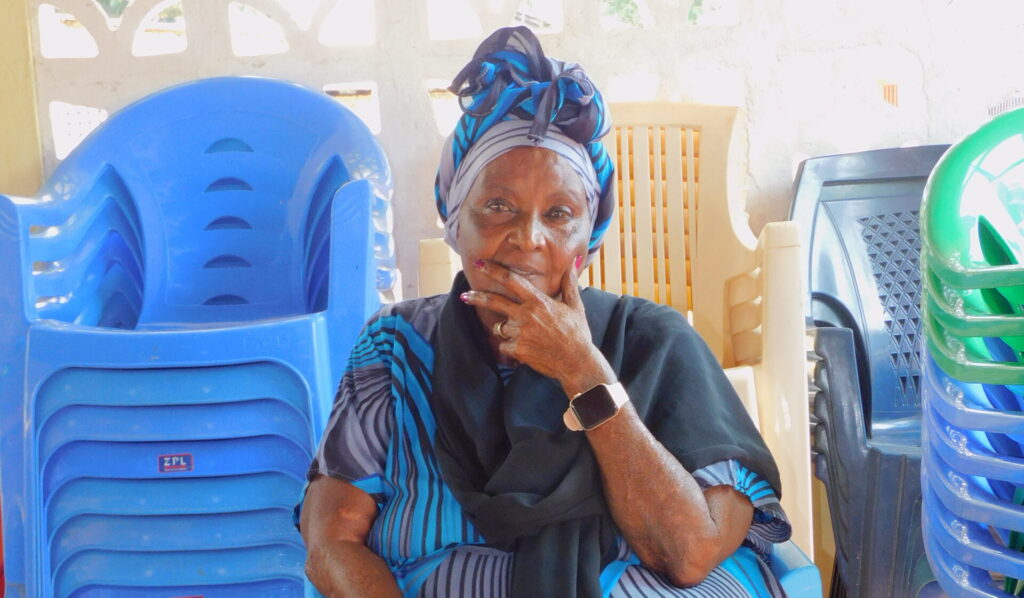This is the story of Zipporah Nyawera, a Christian leader in Coastal Kenya who promotes peaceful coexistence between different religions in Diani. Zipporah breaks boundaries by fostering dialogue and understanding among individuals from different religious traditions.

Tough beginnings
Zipporah arrived in the coastal community of Diani 38 years ago. Initially, she faced difficulties integrating into the Muslim-majority community due to cultural disparities, misinformation and misconceptions that made her harbour certain prejudices. However, as time passed, she gradually immersed herself in coastal culture and found her integration process facilitated by her work at the Coast Interfaith Council of Clerics (CICC). Currently, she works at the Women’s Desk at the CICC, where she raises awareness about gender-based violence (GBV) and promotes positive parenting practices.
I now enjoy the food shared by my Muslim neighbours, recognising that it was misinformation that fuelled my previous reluctance.
Zipporah, now 58 years old, describes her early time in Diani: “When I first settled in this community, I had some unfounded beliefs, especially regarding food shared by individuals of different faiths, particularly Muslims. I was influenced by what I had been told and initially rejected food from the Muslim community. I now enjoy the food shared by my Muslim neighbours, recognising that it was misinformation that fuelled my previous reluctance.”
Now, Zipporah is an active member of interfaith dialogue sessions and shares food with her neighbours during holy days.
The major shift with Cordaid
Joining the Shared Futures Project (spearheaded by Cordaid Kenya) was a significant turning point for Zipporah and her integration journey. The project’s interfaith dialogue sessions, facilitated by the Anglican Development Services Pwani (ADS-P), have transformed Zipporah’s perceptions of coexistence and cohesion.
Dialogues have opened my eyes to the truth that regardless of our differences in faith, we are bound together as brothers
“I am grateful for the opportunity to engage in the dialogues,” says Zipporah. “Through numerous sessions, I realised that those who adhere to different faiths ultimately pray to the same God as I do. Our children attend the same schools, we frequent the same shops, and we seek medical care at the same hospitals. These shared experiences have made me realise that we are all part of one brotherhood, one people before God. Dialogues have opened my eyes to the truth that regardless of our differences in faith, we are bound together as brothers.”

Positive parenting and interfaith dialogue
Within the Shared Futures project, a connection between parenting practices and interfaith cohesion is made. This is because the adverse effects of poor parenting can entrench societal issues, such as the risk of radicalisation and the perpetuation of gender-based violence.
This is why Zipporah actively engages parents in person and through radio talk shows on positive parenting and interfaith dialogues. She promotes social justice initiatives grounded in the shared values of love, compassion, and service across religions.
She emphasises the importance of positive parenting to foster healthy family dynamics and as a preventative measure against violence. Zipporah also underscores the importance of dispelling misconceptions, fostering community relationships, promoting interfaith collaboration, and appreciating cultural diversity as pathways to peaceful co-existence.
In the face of rising concerns about juvenile gangs in Diani, Zipporah emerged as a beacon of hope.
Zipporah’s advocacy work extends beyond individual initiatives in Diani and reaches Msambweni, Lunga Lunga and Kinango in Kwale County, Coastal Kenya. In these places, she collaborates with multiple stakeholders to implement community initiatives aimed at community development and empowerment.
Using dialogue to address complex social issues
In the face of rising concerns about juvenile gangs in Diani, Zipporah emerged as a beacon of hope, spearheading initiatives to address the root causes of youth involvement in gang activities. Recognising the pivotal role of parents in shaping their children’s behaviours, Zipporah initiated dialogue sessions with parents whose children are involved in juvenile gangs.
She extended these dialogues to include the young people themselves, creating a safe space for them to express their concerns and challenges. She also engaged schoolteachers and law enforcement in the dialogue sessions.
Zipporah has reached about 500 parents through one-on-one dialogue sessions and many others through radio talk shows.
As a result of the sessions, many young people chose to surrender their weapons, signalling a willingness to break free from the cycle of violence. Zipporah’s collaboration with law enforcement agencies ensured that those who surrendered weapons were granted amnesty, offering them a chance to continue their education and reintegrate into society without fear of punitive measures.
Zipporah has reached about 500 parents through one-on-one dialogue sessions and many others through radio talk shows. She also offers guidance to young people through the kumbatia forms. Kumbatia is a Swahili word meaning ‘to embrace’. Kumbatia are interreligious dialogue sessions targeting young people of various faiths to promote interfaith coexistence through the Shared Futures Project.
Continued dialogue
Zipporah’s efforts exemplify the power of collaboration and dialogue to bridge divides and build lasting relationships among diverse communities. “Since I successfully facilitated the dialogue with the juvenile gangs, I continue receiving many school requests and invites to talk to parents about positive parenting.”
She explains that, despite facing personal setbacks due to illness, she remains resolute in her commitment to elevating the dialogue sessions to new heights once she recovers. She is also eager to facilitate social exchanges between diverse communities, drawing from the best practices learned from the Shared Futures project.
About the Shared Futures Project
The Shared Futures Project, Youth Leading the way to peaceful Interfaith coexistence, aims to empower youth in Mombasa, Kwale, and Tana River counties to take up a leading role in addressing violent extremism. It is implemented by a consortium of five organisations, with Cordaid as the lead.
The consortium, which includes Samba Sports, Jamii Action Center, Africa Youth Trust, and Anglican Development Services Pwani, collaborates with government representatives, policymakers, Civil Society Organisations, and the community. Collectively, they work towards developing policies that promote interfaith cooperation, aiming to create Shared Futures. The project is a two-and-a-half-year initiative funded by Kerk in Actie and builds upon a previous pilot phase that concluded in 2020.